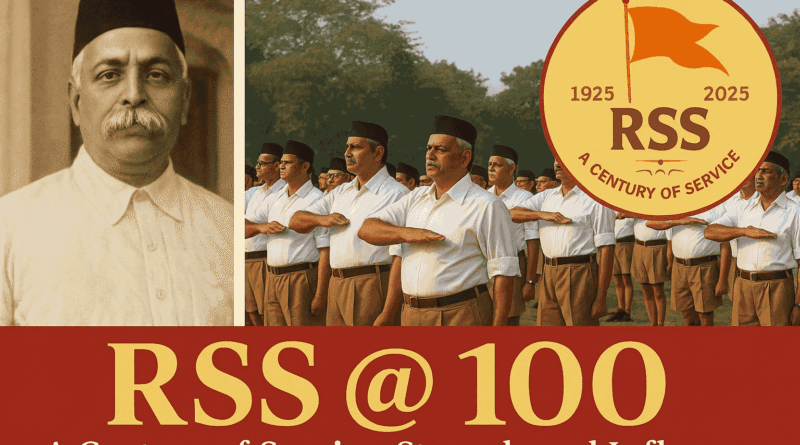100 Years of RSS: A Century of Service, Struggle and Influence
By Public Headlines News Bureau
(Special Centenary Feature | November 2025)

Introduction: From a Gathering in Nagpur to a Global Network
A hundred years ago, in the quiet city of Nagpur, a small group of men led by Dr. Keshav Baliram Hedgewar began meeting with a vision — to rebuild national character and unity through discipline and service. Few could have imagined that this modest initiative, started on 27 September 1925, would evolve into one of the most influential organisations in modern India — the Rashtriya Swayamsevak Sangh (RSS).
As the RSS celebrates its centenary in 2025, it stands at the intersection of reverence, debate and re-evaluation. Loved and criticised in equal measure, it has become both a symbol of cultural nationalism and a subject of political contention.
A Century of Journey: From Hedgewar to Bhagwat
The founding vision of Dr. Hedgewar was simple yet powerful — to awaken national consciousness and moral discipline among India’s youth. The early shakhas (local branches) of the RSS trained volunteers (swayamsevaks) through physical drills, patriotic songs, and discussions on national unity.
Under the leadership of Madhav Sadashiv Golwalkar (Guruji), the RSS expanded its ideological reach and organisational structure. Through the decades, it has navigated bans, political shifts, and societal change — surviving three official prohibitions (1948, 1975, 1992), yet re-emerging each time stronger and more organised.
Today, under Sarsanghchalak Mohan Bhagwat, the RSS claims over 80,000 active shakhas across India and a significant presence abroad through its affiliate organisations.
Ideology: The Spirit of Hindutva
At the heart of the RSS lies the idea of Hindutva — not merely as a religious concept, but as a civilisational identity rooted in the cultural unity of India. The organisation sees itself as a cultural and social movement, not a political party.
However, its influence on politics, particularly through the Bharatiya Janata Party (BJP) and affiliated bodies like the Vishwa Hindu Parishad (VHP), Akhil Bharatiya Vidyarthi Parishad (ABVP), and Seva Bharati, is undeniable. The Sangh Parivar, as this ecosystem is collectively called, has played a pivotal role in shaping India’s political and cultural discourse over the past three decades.
Critics argue that Hindutva promotes exclusivity and undermines India’s secular fabric. The RSS counters this by emphasising inclusivity within the broader concept of Bharatiyata — Indian identity above all divisions.
Service and Social Outreach: The Silent Strength
Beyond ideology and politics, the RSS has built a vast network of social service initiatives — from rural development and education to disaster relief and health care.
Its affiliated bodies operate schools, hostels, hospitals, and relief programs across the country. The Seva Bharati arm has been active in providing assistance during natural calamities and crises, including COVID-19.
The organisation often describes its volunteers not as activists but as “nation builders” — a term central to its ethos of “Man-making before nation-making.”
A Movement Shaping Modern Politics
While officially non-political, the RSS’s ideological influence is most visible in India’s ruling establishment. Many top leaders — including Prime Minister Narendra Modi, Home Minister Amit Shah, and several Union Ministers — began their public life as swayamsevaks.
Through the BJP, the RSS’s cultural philosophy has gained a political expression, making Hindutva a mainstream term in national politics. The partnership between the organisational discipline of the RSS and the electoral strength of the BJP has been a defining force in India’s 21st-century governance.
Centenary Celebrations: Reflection and Renewal
The 2025 centenary celebrations are among the largest ever organised by the Sangh. Events across India are showcasing its historical legacy, social service work, and educational outreach.
The Indian government also released a commemorative coin and postage stamp marking the milestone, with the Prime Minister lauding the organisation’s “service to society and commitment to nation-building.”
In Nagpur, where it all began, the centenary exhibition “Ek Shatak Seva Ka” (A Century of Service) traces the Sangh’s journey through archives, photographs and personal accounts of volunteers.
Criticism and Controversy: The Other Side
No discussion of the RSS is complete without acknowledging its controversies.
It has been accused of majoritarian politics, intolerance toward minorities, and an alleged role in communal polarisation. Its critics view it as an ideological force that blurs the line between religion and nationalism.
Academics often debate whether its vision of cultural unity strengthens national identity or narrows it. Yet, despite criticism, bans and opposition, the organisation has shown remarkable resilience, adaptability and grassroots strength — expanding into a disciplined civil society network unmatched in size and structure.
The Next 100 Years: Challenges and Opportunities
As the RSS enters its second century, the questions it faces are profound:
- Can it evolve with India’s changing demographic and digital reality?
- How will it address the aspirations of a young, urban, and globally connected generation?
- Can its model of shakha-based community building remain relevant in an age of smartphones and social media?
- And most importantly, can it reconcile its cultural mission with India’s pluralistic, constitutional democracy?
The answers to these questions will define not just the future of the RSS, but perhaps the direction of India’s socio-political landscape itself.
Conclusion: Legacy of a Movement
From seventeen volunteers in Nagpur to millions of members across the world, the RSS’s century-long journey reflects both continuity and change. Its imprint on India’s social, cultural and political fabric is deep and enduring.
Whether seen as a guardian of national identity or a polarising cultural force, the RSS at 100 remains one of the most consequential organisations in independent India.
As the organisation looks toward its next century, its challenge will be to blend its traditional ideals of discipline, service and nationalism with the demands of a diverse, democratic and digital India.
Fact File: RSS at a Glance
| Founded | 27 September 1925, Nagpur |
|---|---|
| Founder | Dr. Keshav Baliram Hedgewar |
| Current Chief (Sarsanghchalak) | Dr. Mohan Bhagwat |
| Headquarters | Nagpur, Maharashtra |
| Core Ideology | Hindutva, cultural nationalism, national service |
| Volunteer Base | Approx. 8–10 million swayamsevaks |
| Global Reach | Over 50 countries (via Hindu Swayamsevak Sangh) |
| Centenary Motto | “Ek Shatak Seva Ka – Rashtriya Punarnirman Ka Sankalp” |

